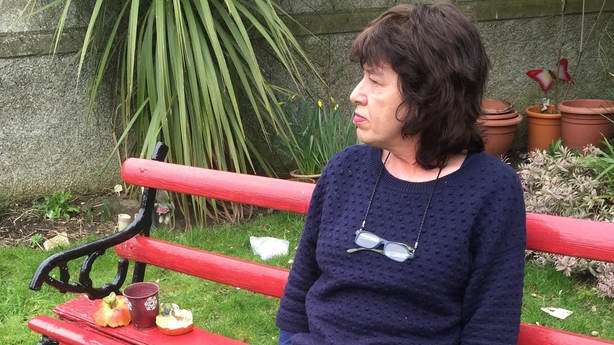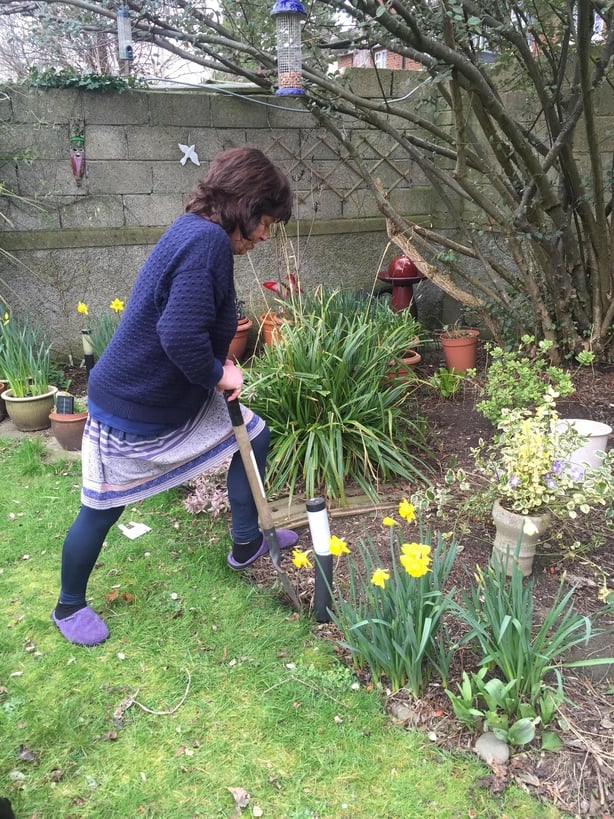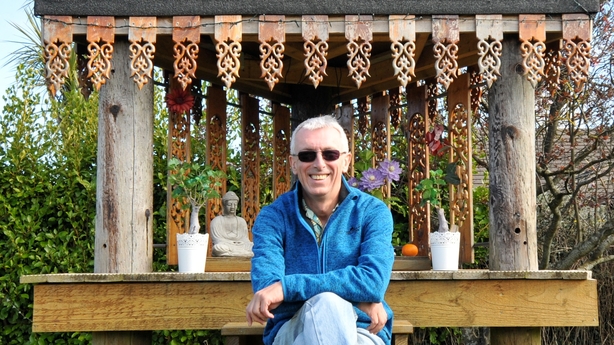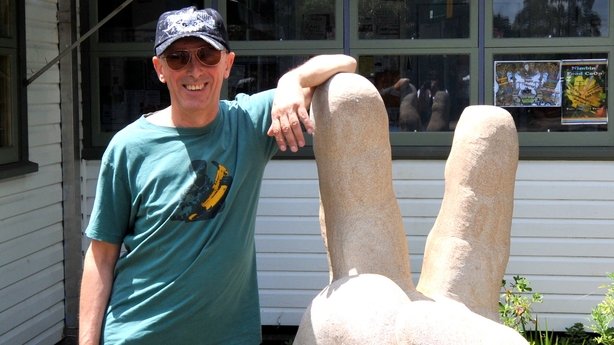Groups supporting people with Hepatitis C have raised concerns about the lack of treatment for people with the virus.
The Irish Haemophaelia Society has called on the next government to expand the current treatment programme.
RTÉ's Aisling Kenny meets some of the people affected
At the moment up to 12,500 people are suffering with the virus in Ireland and only seriously-ill patients are eligible for the treatment, which can cost around €45,000.
Six years ago Emily Reeper was shocked to discover she had Hepatitis C, a viral disease that attacks the liver, contracted through drug use in the 1980s.

"Just to be able to do the garden - like I used to be able to grow vegetables - I don't have the energy to do that now I'm just exhausted, I get down on the ground and I can't get back up," she says.
"I was always very active always ... I'd iron everything you can imagine, now I iron nothing because I just don't have the energy and it kind of gets in on me."
"I'm being attacked by a virus that can be cured ..."
Emily, who now has stage-three liver disease, has been told by doctors that she is not sick enough to avail of the government's treatment programme, which gives chronically ill patients access to medication that can cure the virus.
"I'm getting really sad lately. I know that there is a virus in my body and it's attacking me. I'm living with this every day - I'm being attacked by a virus that can be cured.
"They are waiting for me to get sick to treat me and that's not fair," she says.
"My life is slowing down dramatically. I've burned myself a few times and I'm very slow to heal.
"It's very frustrating to be looking at myself and to be thinking 'God this is this virus,' that's not helping me."

The national treatment programme gives patients access to drugs including one called 'Sovaldi' which costs around €45,000 for a 12-week course .
Nicola Perry, who is the Chairperson of a group which supports people with Hep C, has called for access to the national treatment programme to be expanded to include people like Emily before they become chronically ill.
"I suppose what the Government could do is expand the programme that we have in place.
"What we need to be looking at is expanding to people so we are not waiting before they become quite sick before they are eligible for access.
"So that would mean a review of the current programme and more money, which is something for the department to look at," she adds.
In a statement, the HSE said that through the National Hepatitis C Treatment Programme an advisory group is being established to review criteria for treatment access. It is expected to be extended in the near future.
Some are taking matters into their own hands. Sean Reddin flew to Australia to get life saving medication, after failing to receive the treatment he needed for Hepatitis C in Ireland.

He was treated by a doctor called James Freeman, who had started what is known as the 'Hep C Buyers Club'.
He says: "I think it was at 3am in the morning I had a Skype interview with Doctor Freeman when he went through my whole history.
"He had copies of my blood tests and based on that he was able to write me a prescription. I transferred $1,100 to the Hep C Buyers Club."
"The virus was gone - it meant I'm off death row ... "
Within weeks of taking the drug Sean began to feel stronger and at the end of his treatment he underwent a Hep C test which came back negative.

"My appetite came back I was full of energy waking up early, after four weeks I went for a blood test and the test was testing for the presence of the virus and it came back undetected - which meant the virus was gone - it meant I'm off death row."
Although Sean's experience was a good one, Brian O'Mahony, Chief Executive of the Irish Haemophilia Society, says doctors here are concerned about people getting medication abroad.
"I can understand somebody not wanting to wait several years for treatment for Hep C, but I can also understand the concerns that clinicians would have here, where people are coming into the country with drugs where they are not sure of the safety or advocacy of the drugs or exactly what's in them."
Mr O'Mahony also says the Government should have a competitive national tender process in place to ensure they are getting the best price for the drugs:
"There's more than one company selling the drug. There are different treatment regimes, they are all very effective.
"I think that other countries like Portugal have done this where the more treatment doses that they purchase the lower the cost of each treatment dose - it is called a Price Volume Agreement.
He says: "I think they need to look at a very competitive national tender process so that with the budget that's available for the year they can actually treat more patients."
The HSE said it does not currently have a tender process in place but through the national treatment programme there will be opportunities to consider strategies drug procurement strategies.
Meanwhile, people like Emily wait anxiously to get access to the medication she desperately needs.
"If I get sick it will take a lot more energy to cure me, I will have to be around more specialists if my liver goes into Cirrhosis, I'll have to do more hospital visits - I seem to be banging my head against a wall," she says.
"I need them drugs, I need them," she adds.
The Irish Haemophaelia Society has called on the next government to expand the current treatment programme.
RTÉ's Aisling Kenny meets some of the people affected
At the moment up to 12,500 people are suffering with the virus in Ireland and only seriously-ill patients are eligible for the treatment, which can cost around €45,000.
Six years ago Emily Reeper was shocked to discover she had Hepatitis C, a viral disease that attacks the liver, contracted through drug use in the 1980s.

"Just to be able to do the garden - like I used to be able to grow vegetables - I don't have the energy to do that now I'm just exhausted, I get down on the ground and I can't get back up," she says.
"I was always very active always ... I'd iron everything you can imagine, now I iron nothing because I just don't have the energy and it kind of gets in on me."
"I'm being attacked by a virus that can be cured ..."
Emily, who now has stage-three liver disease, has been told by doctors that she is not sick enough to avail of the government's treatment programme, which gives chronically ill patients access to medication that can cure the virus.
"I'm getting really sad lately. I know that there is a virus in my body and it's attacking me. I'm living with this every day - I'm being attacked by a virus that can be cured.
"They are waiting for me to get sick to treat me and that's not fair," she says.
"My life is slowing down dramatically. I've burned myself a few times and I'm very slow to heal.
"It's very frustrating to be looking at myself and to be thinking 'God this is this virus,' that's not helping me."

The national treatment programme gives patients access to drugs including one called 'Sovaldi' which costs around €45,000 for a 12-week course .
Nicola Perry, who is the Chairperson of a group which supports people with Hep C, has called for access to the national treatment programme to be expanded to include people like Emily before they become chronically ill.
"I suppose what the Government could do is expand the programme that we have in place.
"What we need to be looking at is expanding to people so we are not waiting before they become quite sick before they are eligible for access.
"So that would mean a review of the current programme and more money, which is something for the department to look at," she adds.
In a statement, the HSE said that through the National Hepatitis C Treatment Programme an advisory group is being established to review criteria for treatment access. It is expected to be extended in the near future.
Some are taking matters into their own hands. Sean Reddin flew to Australia to get life saving medication, after failing to receive the treatment he needed for Hepatitis C in Ireland.

He was treated by a doctor called James Freeman, who had started what is known as the 'Hep C Buyers Club'.
He says: "I think it was at 3am in the morning I had a Skype interview with Doctor Freeman when he went through my whole history.
"He had copies of my blood tests and based on that he was able to write me a prescription. I transferred $1,100 to the Hep C Buyers Club."
"The virus was gone - it meant I'm off death row ... "
Within weeks of taking the drug Sean began to feel stronger and at the end of his treatment he underwent a Hep C test which came back negative.

"My appetite came back I was full of energy waking up early, after four weeks I went for a blood test and the test was testing for the presence of the virus and it came back undetected - which meant the virus was gone - it meant I'm off death row."
Although Sean's experience was a good one, Brian O'Mahony, Chief Executive of the Irish Haemophilia Society, says doctors here are concerned about people getting medication abroad.
"I can understand somebody not wanting to wait several years for treatment for Hep C, but I can also understand the concerns that clinicians would have here, where people are coming into the country with drugs where they are not sure of the safety or advocacy of the drugs or exactly what's in them."
Mr O'Mahony also says the Government should have a competitive national tender process in place to ensure they are getting the best price for the drugs:
"There's more than one company selling the drug. There are different treatment regimes, they are all very effective.
"I think that other countries like Portugal have done this where the more treatment doses that they purchase the lower the cost of each treatment dose - it is called a Price Volume Agreement.
He says: "I think they need to look at a very competitive national tender process so that with the budget that's available for the year they can actually treat more patients."
The HSE said it does not currently have a tender process in place but through the national treatment programme there will be opportunities to consider strategies drug procurement strategies.
Meanwhile, people like Emily wait anxiously to get access to the medication she desperately needs.
"If I get sick it will take a lot more energy to cure me, I will have to be around more specialists if my liver goes into Cirrhosis, I'll have to do more hospital visits - I seem to be banging my head against a wall," she says.
"I need them drugs, I need them," she adds.

No comments:
Post a Comment
Note: Only a member of this blog may post a comment.